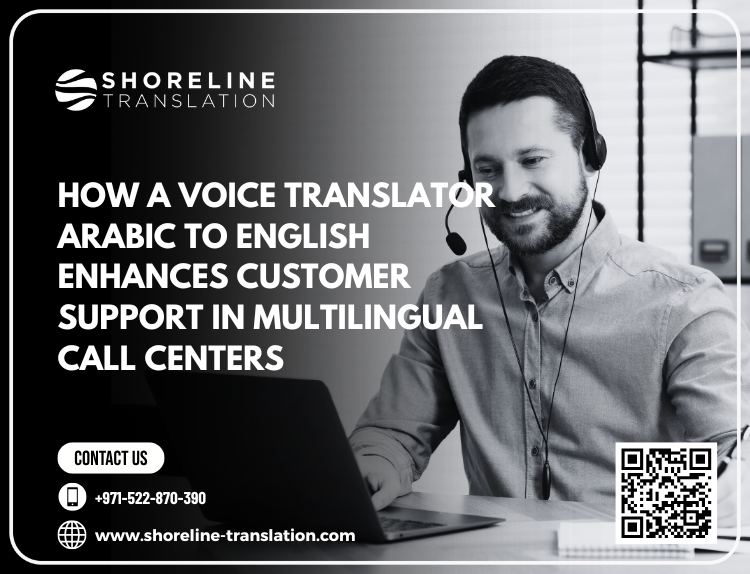Table of Contents
ToggleHow a Voice Translator Arabic to English Enhances Customer Support in Multilingual Call Centers
In today’s globalized business landscape, customer support has evolved into a multilingual necessity. With Arabic being one of the most widely spoken languages across the Middle East and North Africa, the demand for seamless communication between Arabic-speaking customers and English-speaking support agents has surged.
Enter the revolutionary tool: the voice translator Arabic to English. This technology is reshaping how businesses handle multilingual customer interactions, especially in call centers where real-time communication is critical.
This article explores how a voice translator Arabic to English enhances customer support in multilingual call centers, the benefits it brings to businesses, and why partnering with a certified translation company like Shoreline can make all the difference.

The Rise of Multilingual Call Centers
In a world where customer experience is king, offering support in a customer’s native language is no longer optional—it’s expected. According to a CSA Research study, 76% of consumers prefer to purchase products with information in their native language.
This preference extends to customer service, where language barriers can lead to frustration, miscommunication, and ultimately, lost business.
Arabic is the fifth most spoken language globally, with over 420 million speakers. Its prominence in international business, especially in sectors like finance, oil and gas, tourism, and e-commerce, makes it a critical language for customer support operations. However, the complexity of Arabic dialects and script poses challenges for traditional translation methods.
What is a Voice Translator Arabic to English?
A voice translator Arabic to English is a real-time language translation tool that converts spoken Arabic into spoken or written English. These tools use advanced technologies such as:
- Natural Language Processing (NLP)
- Machine Learning (ML)
- Speech Recognition
- Artificial Intelligence (AI)
These technologies work together to ensure accurate and context-aware translations, enabling seamless communication between Arabic-speaking customers and English-speaking agents.
Key Benefits of Using a Voice Translator in Call Centers
1. Real-Time Communication
One of the most significant advantages of a voice translate Arabic to English tool is its ability to facilitate real-time communication. This is crucial in call centers where delays can negatively impact customer satisfaction.
- Immediate understanding of customer concerns
- Faster resolution times
- Enhanced customer experience
Read more about: How Cultural Nuances Affect UAE Arabic to English Translation in Legal Contexts
2. Cost Efficiency
Hiring bilingual agents for every language can be expensive. A voice translator Arabic to English reduces the need for a large multilingual staff, optimizing operational costs.
- Lower recruitment and training expenses
- Reduced need for third-party interpreters
- Increased agent productivity
3. Scalability
As businesses expand globally, their customer base becomes more diverse. A voice translator allows call centers to scale their operations without being limited by language barriers.
- Easily handle high call volumes
- Serve customers across different regions
- Maintain consistent service quality
4. Improved Accuracy
Modern Arabic to English voice translator tools are designed to understand context, tone, and dialects, ensuring more accurate translations than traditional methods.
- Minimized errors and misunderstandings
- Enhanced brand reputation
- Better customer trust
5. Enhanced Agent Performance
Agents can focus on solving customer issues rather than struggling with language comprehension. This leads to:
- Higher first-call resolution rates
- Reduced average handling time
- Improved employee satisfaction
Shoreline: Your Trusted Partner in Professional Translation
When it comes to delivering exceptional multilingual customer support, technology alone isn’t enough. You need a partner with deep linguistic expertise and industry knowledge. That’s where Shoreline comes in.
Why Choose Shoreline?
Shoreline is a leading certified translation company offering professional translation services across various sectors, including:
- Legal
- Medical
- Technical
- Financial
- Marketing
With a team of native-speaking linguists and cutting-edge technology, Shoreline ensures that every translation—whether written or spoken—is accurate, culturally relevant, and contextually appropriate.
How Shoreline Integrates Voice Translation into Call Center Solutions
Shoreline doesn’t just offer translation services—they offer comprehensive language solutions tailored to your business needs. Here’s how they help call centers thrive:
Customized Voice Translation Solutions
Shoreline works with clients to develop tailored voice translator Arabic to English systems that integrate seamlessly into existing call center infrastructure.
- API integration with CRM systems
- Custom vocabulary for industry-specific terms
- Dialect recognition and adaptation
Certified Quality Assurance
Every translation undergoes rigorous quality checks by certified professionals to ensure linguistic and contextual accuracy.
- Native-speaking QA teams
- Continuous improvement protocols
24/7 Multilingual Support
Shoreline offers round-the-clock support in multiple languages, ensuring that your customers are never left without assistance.
- Global coverage
- Fast response times
- Multichannel support (phone, chat, email)
Real-World Applications of Voice Translation in Call Centers
E-commerce
Online retailers serving customers in the Middle East can use English to Arabic voice translation tools to assist with:
- Order tracking
- Return policies
- Product information
Healthcare
Hospitals and telemedicine providers can use voice translate Arabic to English to:
- Schedule appointments
- Explain medical procedures
- Provide emergency support
Travel and Hospitality
Tourism companies can enhance guest experiences by using Arabic to English voice translator tools for:
- Booking confirmations
- Local recommendations
- Customer feedback
Financial Services
Banks and fintech companies can use voice translators to:
- Explain financial products
- Assist with account issues
- Ensure compliance with local regulations
The Future of Voice Translation in Customer Support
As AI and NLP technologies continue to evolve, the future of voice over translation service looks promising. Here are some trends to watch:
- Emotion Recognition: Understanding customer emotions to tailor responses
- Multilingual Bots: AI-powered bots that handle multiple languages simultaneously
- Augmented Reality (AR) Support: Combining visual aids with voice translation for enhanced support
These innovations will further enhance the capabilities of voice translator Arabic to English tools, making them indispensable in customer service environments.
Specialized Use Cases Where a Voice Translator Arabic to English Delivers Strategic Advantage
For businesses operating in high-stakes industries, the integration of a voice translator Arabic to English is not just a convenience—it’s a strategic imperative. These advanced tools are transforming how companies manage risk, compliance, and customer satisfaction across borders.
Legal and Regulatory Compliance
- In sectors such as finance, insurance, and healthcare, miscommunication can lead to legal liabilities. A certified Arabic to English voice translator ensures that all spoken interactions are accurately interpreted, reducing the risk of non-compliance.
- Shoreline’s expert linguists specialize in voice translate Arabic to English services for regulated industries, ensuring that terminology is precise and contextually correct.
Crisis Management and Emergency Support
- During emergencies or crisis scenarios, clear and immediate communication is vital. A real-time voice translator Arabic to English enables call center agents to deliver life-saving information without delay.
- This is especially critical for sectors like aviation, public safety, and emergency healthcare, where English to Arabic voice translation can bridge urgent communication gaps.
Cross-Border Customer Retention
- Businesses with a global footprint often struggle to retain non-English-speaking customers. Using a voice translate Arabic to English tool allows brands to build trust and loyalty by offering culturally sensitive support.
- Shoreline’s solutions are tailored to enhance the customer journey, ensuring that every interaction—regardless of language—is smooth, respectful, and effective.
Enhancing Business Intelligence Through Voice Translation Analytics
Beyond real-time communication, modern voice translator Arabic to English systems offer powerful data analytics capabilities that can inform strategic decisions and improve service delivery.
Conversation Analytics for Quality Assurance
- Advanced Arabic to English voice translator platforms can transcribe and analyze conversations to identify trends, common issues, and agent performance metrics.
- Shoreline integrates these insights into its service model, helping businesses refine training programs and improve overall service quality.
Customer Sentiment Analysis
- By leveraging AI-driven voice translate Arabic to English tools, businesses can detect customer sentiment based on tone, word choice, and speech patterns.
- This enables proactive service adjustments and personalized engagement strategies, particularly useful in industries like hospitality, telecom, and e-commerce.
Market Intelligence and Localization Strategy
- Aggregated voice translation data can reveal linguistic preferences, regional dialect usage, and cultural nuances, guiding product localization and marketing campaigns.
- Shoreline’s certified translation experts use this data to help clients develop more effective multilingual strategies, ensuring that English to Arabic voice translation aligns with local expectations and business goals.
These additional insights underscore the transformative potential of a voice translator Arabic to English in today’s multilingual business environment. With Shoreline’s expertise and technology, companies can go beyond translation—unlocking new levels of intelligence, efficiency, and global customer engagement.
Speak the Language of Your Customers with Shoreline
If you’re looking to elevate your customer support with cutting-edge voice translation technology, look no further than Shoreline. With a proven track record in delivering high-quality, certified translation services, Shoreline empowers businesses to communicate effectively with their global audience.
✅ Get in touch today for a free consultation
✅ Discover how our voice translation solutions can transform your call center
✅ Let Shoreline be your bridge to global customer satisfaction
Frequently Asked Questions (FAQs)
1. What is the best voice translator Arabic to English for call centers?
The best voice translator Arabic to English for call centers combines real-time translation, dialect recognition, and CRM integration. Shoreline offers customized solutions tailored to your industry and customer needs.
2. How accurate are voice translation tools for Arabic?
Modern Arabic to English voice translator tools use AI and NLP to ensure high accuracy. However, working with a certified provider like Shoreline ensures that translations are not only accurate but also culturally appropriate.
3. Can voice translation tools handle different Arabic dialects?
Yes, advanced voice translate Arabic to English systems can recognize and adapt to various Arabic dialects. Shoreline’s solutions are designed to accommodate regional linguistic nuances.
4. Is voice translation secure for sensitive customer data?
Absolutely. Shoreline follows strict data protection protocols and uses encrypted channels to ensure that all voice translation interactions remain confidential and secure.
5. How can I integrate a voice translator into my existing call center?
Shoreline provides end-to-end integration services for voice translator Arabic to English tools. Their team works closely with your IT department to ensure seamless implementation and minimal disruption.
Conclusion
In an increasingly interconnected world, language should never be a barrier to excellent customer service. A voice translator Arabic to English is more than just a tool—it’s a bridge between cultures, a driver of customer satisfaction, and a catalyst for business growth.
By partnering with a trusted, certified translation company like Shoreline, businesses can ensure that their multilingual call centers are equipped to meet the demands of a global customer base. From real-time voice translation to industry-specific solutions, Shoreline is your go-to partner for professional, reliable, and scalable language services.
Ready to transform your customer support experience? Let Shoreline help you speak the language of success.





